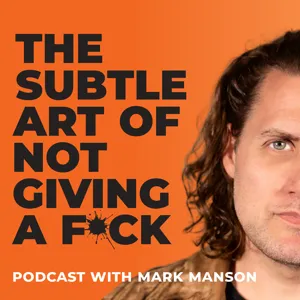Podcast Summary
Recognizing and disengaging from emotionally unavailable people: Prioritize relationships based on mutual respect, appreciation, and effort. Avoid investing in those who don't reciprocate and don't contribute positively to personal growth.
Investing time, energy, and emotions into people who don't reciprocate can lead to toxic cycles and hinder personal growth. It's important to recognize and disengage from emotionally unavailable individuals, rather than treating relationships as a competition or a status game. Additionally, taking others for granted can lead to valuable relationships being overlooked. Practicing appreciation, gratitude, and consistently showing it to those in our lives can help strengthen and maintain healthy relationships. However, easier said than done, as these lessons can be challenging to implement. Furthermore, the dating app industry, such as Hinge, may contribute to these toxic cycles by designing features that encourage addictive behavior and short-term satisfaction, potentially leading users to stay single longer.
Our relationship with technology and dating apps: Consider the potential benefits and drawbacks of using technology for meeting people, and strive to use it in a way that enhances your life rather than detracts from it.
Our relationship with technology, particularly dating apps, can be addictive and raise questions about where the line between fun and problematic lies. Some argue that the digital world, with its formalized and monetized algorithms, can be more apparent and potentially more addictive than older methods of meeting people. However, it's important to consider that every generation has had concerns about new technologies and their potential negative effects. While some argue that social media can be detrimental for young people due to its impact on brain development and social relationships, for others it may just be a way to pass the time. Ultimately, it's up to each individual to use technology in a way that enhances their life rather than detracts from it. And, as always, it's important to remember that we have some control over our relationship with technology and should not blame external factors for our own actions.
Comparing ourselves to past selves vs others: Focusing on personal growth by reflecting on past selves is a healthier alternative to negative comparison
Comparing ourselves to others can be both healthy and unhealthy. Growing up, some parents imposed restrictions on TV usage similar to social media use today. The speaker has learned to compare herself to her past selves instead of others, which has been beneficial in her personal growth. Social comparison is a natural human tendency, and it can be healthy when we use it as motivation or look up to role models. However, it becomes unhealthy when we engage in negative self-comparison or compare ourselves to unrealistic or inaccurate representations of others. The speaker suggests that focusing on personal growth and development by reflecting on past selves can be a healthier alternative to comparison. It's essential to recognize the nuances of comparison and use it as a tool for self-improvement rather than a source of self-deprecation.
The Dark Side of Social Comparison: Social comparison can lead to feelings of inadequacy and tribalism when taken to extremes. Focus on self-improvement and accepting others' ambiguities for meaningful connections.
While social comparison can help us understand ourselves and find communities, it can also lead to feelings of inadequacy and tribalism when taken to extremes. Social media, in particular, presents a caricatured version of reality, making it difficult to appreciate the ambiguity and complexity of real human beings. Moreover, expecting others to change for our sake can lead to resentment and unhealthy dynamics in relationships. Instead, focusing on self-improvement and accepting the ambiguities and struggles of others can lead to more meaningful connections. It's important to remember that even the most admired figures have faced criticism and adversity, and that true change comes from within.
Meeting people where they're at and offering gentle guidance: Avoid forcing change on others, instead offer guidance when they're open to it, and remember change is a personal journey.
Trying to force change on others often leads to resistance and ineffectiveness. Instead, it's more productive to meet people where they're at and offer gentle guidance when they're open to it. As Lori Gottlieb pointed out, it's also challenging to change ourselves, so it's essential to avoid expecting others to change to avoid our own discomfort. When it comes to giving advice, it's crucial to be mindful of the potential pitfalls, such as subverting the learning process or imposing our solutions on others. The best approach is to set an example and let others come to us when they're ready to learn and grow. As the speaker learned the hard way, change is a personal journey, and the most effective way to inspire it in others is by leading by example.
Actions speak louder than words: Actions can be a powerful form of avoidance, especially when dealing with emotions. Acknowledging and addressing underlying emotions can help unlock ignored parts of our lives.
Actions speak louder than words. When we contradict others' beliefs with our actions, it becomes difficult for them to ignore us. Emerson's quote, "I can't hear what you're saying because your actions are speaking so loudly," emphasizes this idea. As a teenager, the speaker found it infuriating when adults told them to "do as I say, not as I do." This inconsistency can be a powerful form of avoidance, especially when it comes to dealing with emotions. The speaker shares how they used to bury their emotions by intellectualizing them or avoiding them altogether. However, they learned that leaning into these emotions and taking responsibility for past actions is crucial for growth and self-awareness. Memory can remove unpleasant experiences, but acknowledging and addressing the underlying emotions can help unlock these ignored parts of our lives.
Understanding Emotions for Personal Growth and Relationships: Recognize emotions for growth, share vulnerably for deeper connections, but avoid overindulgence or suppression.
Recognizing and understanding our emotions is crucial for personal growth, but it's important not to suppress or overindulge them. Emotional vulnerability is essential for building meaningful relationships, but it's not about seeking validation or attention. Instead, it's about honestly sharing who we are, with the understanding that rejection is a possibility. The difference between TikTok vulnerability and real vulnerability lies in the intention behind sharing. While TikTok vulnerability is a means to avoid rejection and hide who we really are, real vulnerability is about exposing ourselves, acknowledging the risk of rejection, and sharing our authentic selves. Emotional intelligence and vulnerability are key to building deeper connections and living a fulfilling life.
The interconnection of honesty, vulnerability, and freedom: In the digital age, authentic honesty and vulnerability have been distorted, leading to performative versions and disconnection from true meaning. Prioritize sleep and authenticity to experience the benefits.
Honesty, vulnerability, and freedom are deeply interconnected. When we are truly honest and vulnerable, we experience a sense of liberation. However, in the digital age, these concepts have become distorted, leading to performative vulnerability and a disconnect from authenticity. This can be seen in the way mental health discussions have evolved online, with terms like vulnerability and trauma being used in ways that are opposite to their true meanings. Furthermore, sacrificing sleep for productivity or fun, although once seen as a badge of honor, is actually detrimental to our well-being. Despite the cognitive and physical deficits that come with sleep deprivation, many people believe they have adjusted and are performing just as well. However, this is not the case. It's important to prioritize sleep and authenticity in our lives to truly experience the benefits of honesty and vulnerability.
Understanding Personal Health Needs: Being aware of personal biology and flexible with health habits is crucial for maintaining good health. Everyone's relationship with sleep and substance use is unique, and being honest about personal challenges can lead to better choices and improved overall well-being.
Everyone's relationship with their health, particularly sleep and substance use, is unique. Some people may be able to push their limits without significant consequences, while others may experience more severe repercussions. Being aware of personal biology and flexibility around health habits is crucial. For instance, someone who has always slept easily may find it easier to be flexible with their sleep schedule, whereas someone who struggles with sleep may require more strict adherence to healthy habits. Similarly, some individuals may be able to consume alcohol or other substances in moderation, while others may find that even small amounts lead to negative consequences. The speaker's experience with quitting alcohol after a long history of use highlights the importance of considering one's relationship with substances and being honest about the challenges of quitting. Ultimately, being mindful of personal health needs and being strategic about health choices can lead to improved overall well-being.
Taking a break from alcohol can lead to numerous benefits: Improved sleep, better workouts, enhanced self-awareness, and better decision-making are some benefits of giving up alcohol
Taking a break from alcohol consumption, even if it's relatively easy for some people, can lead to numerous benefits beyond just weight loss or detoxification. These benefits include improved sleep, better workouts, enhanced self-awareness, and better decision-making. I was surprised to realize that my drunken self was not the best version of myself, and the mental and emotional toll of alcohol on my relationships was more destructive than I had initially thought. It's interesting to note that self-destructive behaviors, such as excessive drinking, were once considered cool or even desirable, but times are changing, and the trend towards self-care and wellness is gaining momentum. As a sober person, I've been reflecting on why self-destructiveness was celebrated for several decades and why it's no longer the case. It's a complex question with no easy answers, but it's worth considering the long-term consequences of our actions and the impact they have on our lives and the lives of those around us.
The 1980s and 1990s: A Time of Rebellion and Unhealthiness in the Music Scene: The grunge rock era was marked by a profound unhealthiness among artists, who were celebrated despite their self-destructive behaviors. The rebellion against the suburbs and American dream defined this era, leaving a lasting impact on popular culture.
The music scene of the 1980s and 1990s, particularly the grunge rock era, was marked by a profound unhealthiness among its artists, many of whom were celebrated despite their self-destructive behaviors. This was a time when the economy was booming and there was a sense of optimism, leading some people to invent problems when they didn't have any real ones. The revolt against the suburbs and the American dream became a defining characteristic of the era, with artists like Kurt Cobain and Nirvana becoming symbols of this rebellion. Looking back, it's clear that many of these artists were mentally and emotionally unstable, and their tragic ends were often celebrated. As we reflect on this period, it's important to remember the impact it had on our culture and the lessons we can learn from it. The nineties were an interesting time to grow up, with a sense of confusion and uncertainty about what came before and what came after. It was a time of invention and self-discovery, and it left a lasting impact on popular culture.






